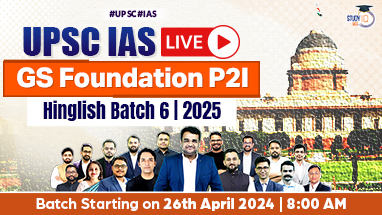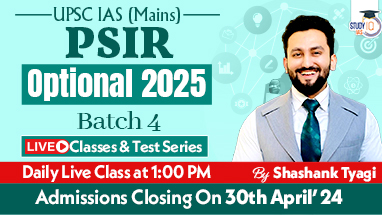Daily Current Affairs for UPSC 2023
Q) Which of these articles of the Indian Constitution deals with the privileges and immunities of either House of the Indian Parliament?
- Article 194
- Article 121
- Article 105
- Article 123
Daily Current Affairs for UPSC – 10 February 2023
Explanation:
- Option (1) is incorrect: Article 194 deals with the powers, privileges and immunities of the State Legislatures, their Members and their committees.
- Option (2) is incorrect: Article 121 of the Constitution of India prohibits any discussion in Parliament regarding the “conduct of any Judge of the Supreme Court or of a High Court in the discharge of his duties except upon a motion for presenting an address to the President praying for the removal of the Judge
- Option (3) is correct: The powers, privileges and immunities of either House of the Indian Parliament and of its Members and committees are laid down in Article 105 of the Constitution. It has four clauses.
- Subject to the provisions of this Constitution and to the rules and standing orders regulating the procedure of Parliament, there shall be freedom of speech in Parliament.
- Member of Parliament shall be liable to any proceedings in any court in respect of anything said or any vote given by him in Parliament or any committee thereof, and no person shall be so liable in respect of the publication by or under the authority of either House of Parliament of any report, paper, votes or proceedings.
- In other respects, the powers, privileges and immunities of each House of Parliament, and of the members and the committees of each House, shall be such as may from time to time be defined by Parliament by law, and, until so defined, shall be those of that House and of its members and committees immediately before the coming into force of section 15 of the Constitution (Forty-fourth Amendment) Act, 1978.
- The provisions of clauses (1), (2) and (3) shall apply in relation to persons who by virtue of this Constitution have the right to speak in, and otherwise to take part in the proceedings of, a House of Parliament or any committee thereof as they apply in relation to members of Parliament.
This immunity extends to certain non-members as well, such as the Attorney General for India or a Minister who may not be a member but speaks in the House.
- Option (4) is incorrect: Article 123 deals with the power of President to promulgate Ordinances during recess of Parliament.
Q) Which of the following can cause glacial lake outburst flood (GLOF)?
- Earthquakes of high intensity.
- Geomagnetic Storms
- Mining and Construction activities.
- Rising temperatures and increased rainfall due to climate change
Select the correct answer using the code given below:
- 1, 2 and 3 only
- 1, 3 and 4 only
- 2 and 4 only
- 1, 2, 3 and 4
Explanation:
- Statement 1, 3 and 4 are correct: The International Centre for Integrated Mountain Development defines a GLOF as ‘the sudden release of water from a lake fed by glacier melt that has formed at the side, in front, within, beneath, or on the surface of a glacier’. There are several causes of GLOFs, including:
- Structural failure: When glaciers start to melt, they can create glacial lakes. The water in these lakes can put pressure on the natural dam that holds the water in, causing it to fail.
- Earthquakes: Earthquakes can cause sudden changes in the shape and stability of a glacial lake and its dam, leading to a GLOF.
- Climate change: Rising temperatures and increased rainfall can lead to more meltwater and therefore more glacial lakes, as well as increase the risk of GLOFs.
- Human activities: Human activities, such as construction or mining, can cause changes in the area around a glacial lake that can lead to a GLOF.
- Statement 2 is incorrect: During magnetic storms, satellite electronics can be damaged through the buildup and discharge of static-electric charges. Astronauts and high altitude pilots can be subjected to increased levels of radiation. Even though rapid magnetic field variations are generated by currents in space. Moreover, Solar flares and magnetic storms belong to a set of phenomena known collectively as “space weather”. Technological systems and the activities of modern civilization can be affected by changing space-weather conditions. However, it has never been demonstrated that there is a causal relationship between space weather and earthquakes or glacial lake outburst flood.
Q) With reference to the Lithium Reserve, consider the following statements:
- China has the largest lithium reserves in the world.
- The largest lithium reserves in India are located in the district of Alwar in Rajasthan.
- At present China is the single largest consumer and producer of lithium-ion batteries in the world.
Which of the statements given above is/are correct?
- 1 and 2 only
- 1 and 3 only
- 2 and 3 only
- 1, 2 and 3
Explanation:
Lithium is a non-ferrous metal and a chemical element with the symbol Li and atomic number 3 belonging to the alkali metal group of elements.
- Statement 1 is incorrect: Chile has the largest lithium reserves in the world, with an estimated 7.5 million tons of lithium carbonate equivalent while China has significant lithium reserves, with an estimated 1.4 million tons of lithium carbonate equivalent.
- Statement 2 is correct: Lithium deposits in India are relatively limited compared to other countries, but there are a few known reserves in the country. Some of the areas where lithium has been found in India include:
- Rajasthan: The largest lithium reserves in India are located in the district of Alwar in Rajasthan.
- Karnataka: Smaller deposits of lithium have been found in the state of Karnataka, particularly in the districts of Bangalore Rural and Mysore.
- Andhra Pradesh: Lithium deposits have also been found in the state of Andhra Pradesh, in the districts of Anantapur and Cuddapah.
- Statement 3 is correct: Around the World, China has been the largest consumer of lithium-ion (or li-ion) batteries for five consecutive years. China controls 60 per cent of the world’s capacity for processing raw lithium products into batteries. Estimates say that China’s dominance in the market for lithium-ion batteries production could be as high as 80 per cent.
Q) Which of the following metal is dubbed as “white gold”?
- Chromium
- Lithium
- Nickel
- Platinum
Explanation:
- Option (2) is correct: Lithium is a non-ferrous metal and a chemical element with the symbol Li and atomic number 3 belonging to the alkali metal group of elements. It’s a silvery-white metal with a delicate texture. It is the lightest metal and the lightest solid element under normal circumstances. Lithium has been dubbed “white gold” for its widespread usage in items indispensable to modern-day living.
Q) Which of these statements with reference to ‘Alternative Investment Fund’ (AIF) is correct?
- AIFs in India are mandatorily regulated by the Reserve Bank of India.
- AIFs are not allowed to participate in the secondary market in India.
- AIF rules do not apply to venture capital funds and hedge funds in India.
- AIFs in India are authorized to raise funds from both Indian and foreign investors.
Explanation:
- Option (4) is correct: Alternative Investment Fund (AIF), in market parlance, refers to a privately pooled investment vehicle which collects funds from investors whether Indian or foreign for investing these funds in India.
- Option (1), (2) and (3) are incorrect: In India, AIFs are defined in Regulation 2(1) (b) of Securities and Exchange Board of India (Alternative Investment Funds) Regulations, 2012. They are regulated by the SEBI. Broadly, the AIF rules govern venture capital funds, private equity funds, SME funds, hedge funds among others. Under the rules, Category III AIFs can invest not more than 10% of the investable funds in an investee company, directly or through investment in units of other AIFs. Moreover, SEBI has introduced regulatory framework for special situation funds (SSFs). The new regulations now for a special sub-category of AIFs, namely SSFs, which allowed AIFs to participate in the secondary market for loans extended by banks and NBFCs to companies that have defaulted on their debt obligations.

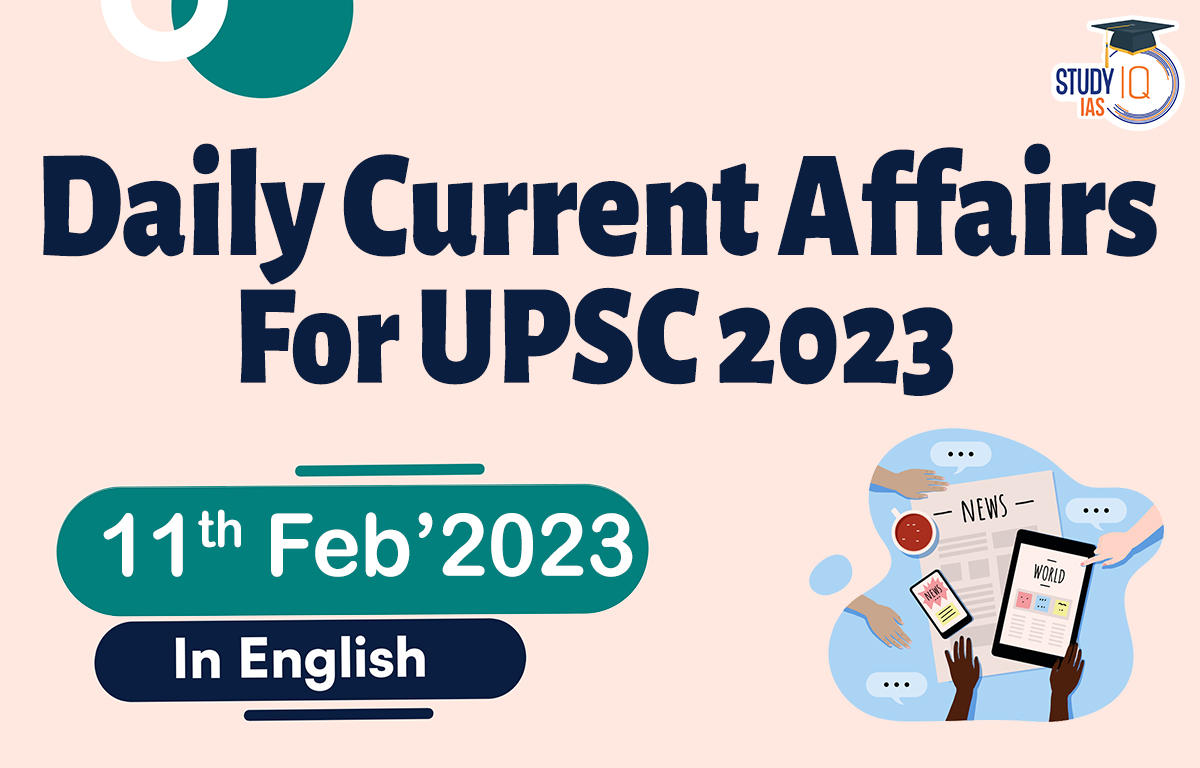
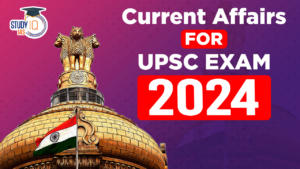 Current Affairs 25th April 2024 for UPSC...
Current Affairs 25th April 2024 for UPSC...
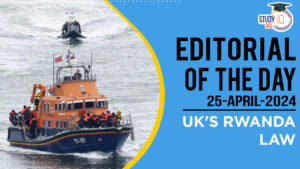 Editorial of the day (25th Apr): UK's Rw...
Editorial of the day (25th Apr): UK's Rw...
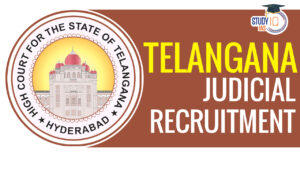 Telangana Judicial Recruitment Notificat...
Telangana Judicial Recruitment Notificat...
